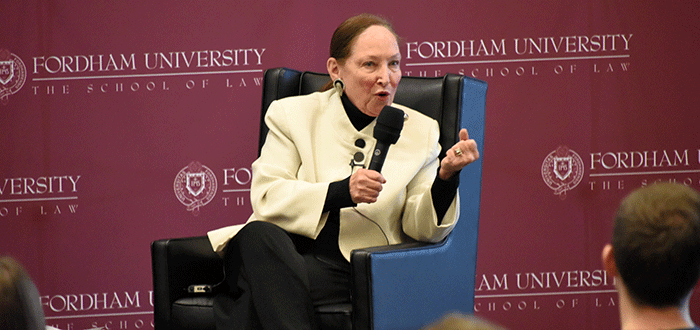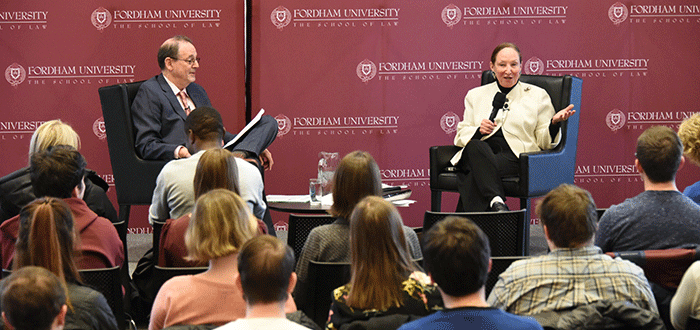Justice Rosalie Abella of the Supreme Court of Canada visited Fordham Law on Wednesday March 13 to talk with students about her perspective from 15 years on Canada’s highest court. In a conversation with Professor James Brudney attended by close to 400 first-year Legislation and Regulation students, Justice Abella highlighted differences between her country’s jurisprudence and that of the United States, her approach to judging, and values she holds dear.
Much of the conversation revolved around the idea of statutory interpretation, the process by which judges carefully examine the text of a statute or other piece of legislation in order to determine its meaning. As a law student at the University of Toronto, Justice Abella did not formally study statutory interpretation and only began to consider it a separate discipline when she became a judge.
While U.S. courts frequently refer to textual canons as helpful guideposts for interpretation, the Canadian court system takes a more holistic approach, according to Justice Abella.
“Our judges don’t draw lines over whether to follow a linguistic word approach or an intentionalist approach,” she said. “We just look at how we think this provision should be interpreted in light of all the things you worry about: what did the legislature mean, what do the words say, what was the purpose of the statute, all of that.”

Justice Abella discussed the importance of the Edwards v Canada case, more commonly known as the Persons Case, which concluded that women were eligible to sit in the Senate of Canada. In the 1929 decision, Lord Sankey stated that the British North America Act is “a living tree capable of growth and expansion within its natural limits.” Justice Abella spoke about this idea, the living tree doctrine, as a basic guiding principle.
“[The living tree doctrine] is constitutional but it’s also philosophically foundational,” she said. “It’s how we approach not only the constitution but also our statutes. What is the fair, appropriate, and just meaning of the phrase? We read it in the most reasonable way possible.”
Displaying her knowledge of and interest in her U.S. peers, Justice Abella discussed some recent U.S. Supreme Court decisions and the competing interpretive principles—textualism, intentionalism, pragmatism—that inform SCOTUS decisions.
During a Q&A following the conversation, students asked Justice Abella about her role as a mentor, her proudest achievements as a judge, and the independence of the judiciary. In her response to this last topic, Justice Abella said, “I think some things are universal. Judges have the duty to defend the independence of the judiciary wherever they see it at risk.”
Justice Abella’s March 13 appearance at Fordham Law comes a little over a year after she last visited the Law School, when she delivered the Robert L. Levine Distinguished Lecture.

